LTC (Ret.) BILL GOLDEN, Army Iraq/Afghanistan Combat Pilot and Commander, 3/160th SOAR (“Night Stalkers”)
William (Bill) Golden was born (1969) and raised in the small town of Dixon Mills, Alabama, situated “in the middle of nowhere,” population “a few hundred,” located about two-hours north of Mobile. Surrounded at home by a whole lot of timber and cattle, this one-time self-described ‘farm boy’ would grow up to fly and command some of the most sophisticated combat rotary-wing aircraft in the United States Army inventory.
Bill Golden attended Middle and High School in Sweet Water, Alabama. He played baseball and basketball, no mystery to the latter as he already stood 6’ 3” making him a popular and effective stand-out. Small town, very normal small school (1-A) which, predictably, was the center of focus among the Sweet Water residents. However, the center of focus for Golden and his male friends was the “Ag Shop” and teacher, Mr. Phillips. “We all tried to spend as much time each day hanging out with him, and as little time as possible hanging out with our Algebra & English teachers (!),” he recalled.
An awareness of our military would, indeed, enter his life, but with no real impact during his high school years. His dad had, in fact, been drafted during the Vietnam era, but he never received orders to the combat zone. His uncle was also drafted into the Army, but he did end up deploying to Vietnam. Those family experiences were all he really knew about military service, and again, the notion of joining the Army never entered his mind in high school.
In fact, he not only had no intention of joining the military after graduation, he also had absolutely no desire to go on to college! But, regarding the latter, his dear and concerned mother had other ideas for young Bill. Amazingly, she took it upon herself to go to his high school, meet with his guidance counselor, then fill out a college application for him, submit it, and it actually ended up gaining not only his admission, but even a partial scholarship! The latter, perhaps not totally surprising, since “without studying much,” he had achieved good grades in school. But prior to Mom Golden’s unexpected initiative on his behalf, his announced intention was to go to work at the near-by paper mill along with his dad (who hoped that would happen, as well). “Yep, live on the farm and work at the mill, since that was the big industry down there,” remembered Golden.
The college scholarship was to Livingston University, a small liberal arts school (since renamed the University of West Alabama). For the first year (1988), he commuted by car with a high school friend. After a year on the road, he decided that his commuting college experience was “just not rich enough,” which he admits might have had something to do with breaking up with a girl! So, he moved to Livingston University and lived that next year with three guys in a trailer, for that “richer” college experience! Well, that enticing living arrangement about did him in as a collegian, so after a year of crowded trailer life, he knew, at last, that he really did have to get serious about college and transferred to the University of Alabama. He began his studies there in the Fall of 1990.
And now, finally, the idea of military service enters his mind and life, but almost by unintended proximity. At Alabama, he would share an apartment with a young man named Chad Ward, whom he knew from Livingston University. And here’s the key that would now unlock Bill Golden’s military door. You see, Chad Ward had moved on to the University of Alabama with the definite, and primary, intent to become an Army ROTC cadet. So committed was he, in fact, that the summer before beginning at Alabama, he had gone off to the National Guard’s basic training program (SMP), providing him with some introductory Army experience and a bit of scholarship money.
So, Chad comes home from training, school begins, and “conversations about the military” inevitably begin, as well. It didn’t click with Golden right away. He was a self-described (and likely over-stated!) “long-haired, trouble-making rebel,” whose real goal at the time was to graduate and go on to law school. Before long, however, Chad, thankfully, convinced short-lived- “hippie,” Bill Golden, to go with him to an ROTC event. “So, I go and meet a bunch of the guys and I really have a lot in common with them. Right away, I realized that I liked these guys. They were just good people,” recalled Golden. With few new friends yet, since he’d just moved to the university, these young men quickly became a natural and comfortable source of friendships. Before long, he had joined with some of them on an ROTC-based competition team, named “Ranger Challenge.”
He started training with them and, along the way, met all of the ROTC unit’s cadre, the active-duty Army staff assigned to the unit.
Along with that, perhaps a natural progression, since he was now spending so much time around both the cadets and the unit’s supervising soldiers, he began taking some of the ROTC program courses. Before long, he was asked if we would be interested in attending the ROTC basic camp that next summer. That would consist of eight weeks at Fort Knox, Kentucky, and if he did really well in that program, he would be able to earn an ROTC scholarship. Golden did attend the summer program and ended up doing very well. How well? Oh, just becoming the very top student graduate in that particular camp cycle! His early upbringing had helped…a lot. Said he: “I’d grown up in the woods! I could navigate. I could patrol. And, physically, I had the ability. So, to me, it was a fairly easy fit.”
Upon return to campus, he met with his cadre who then offered him a two-year, full-ride ROTC scholarship, if he was interested. He replied that he was definitely interested, but “I really want to go to flight school.” By then, academically, he had become disillusioned with law, and had moved his undergraduate major over to corporate finance/investment management. He did decide to accept the scholarship, requiring him to sign a contract with the United States Army, with two-years of study left on what had now become a five-year university program, since he had lost hours when he transferred from Livingston.
That next summer, it was time for ROTC advanced camp, where he, again, did extremely well, becoming the top cadet from the Honor Platoon achieving the top score (a “5” on their grading scale). Only 10% of the 40 cadets he had trained with would achieve that top score. Now as a senior, based on his summer performance, he was promoted to serve as Executive Officer for Alabama’s ROTC battalion. That put Golden in charge of the unit’s Ranger Challenge team. And, under his leadership, that year, his team won the Ranger Challenge for the entire region, a goal long sought by his unit. Then, in December, he was informed that he had been ‘picked up’ for Army Aviation! Typically, only one cadet out of the entire senior class gets selected to go forward in aviation. In this case, for Golden, it was a combination of his top achievements and the encouragement/mentoring of the ROTC’s professional military leadership.
Meanwhile, that senior year at Alabama, in the midst of his growing accomplishments, as those college years had become ever more serious to him, he had met the young lady who would be the love of his life, and so prior to leaving for his advanced camp summer training before his senior year at Alabama, he made time for one more vitally important life-time achievement: he married Carey! So, as he began his senior year, he had a beautiful wife and had now become the ROTC unit’s battalion commander! The battalion won many awards that year, with Senior Cadet Golden in command. Prior to university graduation, Golden’s first son, William, was born. Then this great, young, growing family packed up and headed to Army flight school at Fort Rucker, Alabama!
Bill Golden began flight school in November 1993. The Basic and Initial Entry Rotary Wing Courses took about a year. From there, after a bit of a wait, it was off to Advanced Flight Training. Golden was asked if he wanted to go forward flying fixed wing or rotary.
Without hesitation, his choice was rotary: “I wanted to fly Apaches. I definitely wanted to fly attack aircraft!” He finished #3 in his advanced class, and as a result, received approval to fly his first aircraft choice: the Apache!
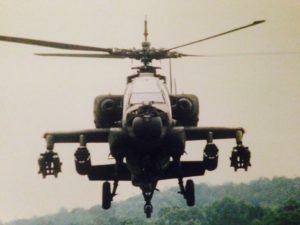
2LT Bill Golden flying AH-64 Apache, Ft. Rucker 1995
And so, his specific training on that airframe began. Pretty quickly, however, he began to have Apache doubts. “That’s about the time I came to the conclusion that I don’t know whether I’m cut out to fly Apaches. It was really difficult to fly this thing with one eye!” That “eye” reference was to a part of the flight program called the ‘bag phase.’ The first few weeks, he was taught to simply fly the aircraft, VFR, etc. ‘And then, they put you in the ‘bag’ and it’s a miserable, miserable experience. The windows are covered in foil, and the only way you can see is through a one-inch glass in front of your right eye. So, your whole world is made to exist just three feet below you and nine feet in front.” And the reason for doing this? “Making you rely 100% on that little right-eye optic, and you have to learn not only to look through it, but also to read all the symbology. It’s really, really difficult,” remembered Golden.
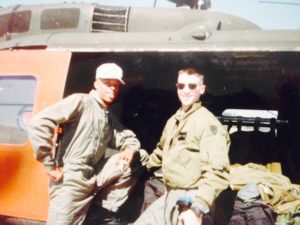
2LTs Bill Golden and Bryce Dudley
Flight School Stick Buddies Ft. Rucker, Al 1994
But, as he recalled, it’s kind of like learning to ride a bike. “You hate it, you hate it, you hate it, and then one day you get it. And true to what they say, you know, just stick with it and you’ll get it.” He stuck with it, and he ‘got it’! Golden completed his training with an assignment to 18th Airborne Corps at Fort Bragg, North Carolina, to fly Apaches with the 229th Attack Helicopter Regiment there, “which was the best assignment I thought you could get. I was very proud to be going to Fort Bragg.”
First-Lieutenant Golden arrived at Fort Bragg in June of 1995 and was given an Apache platoon (four aircraft) right out of the gate. He flew with his four-aircraft group for a year-and-a-half, and all is progressing well.
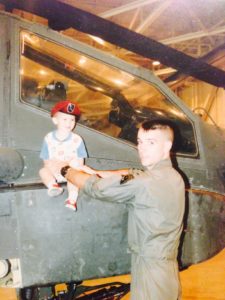
1LT Bill Golden with his son, Blake
At that point, he was ‘put up’ for pilot command (rear seat of the Apache). As he made that advancement, he and his group were notified that they would then be going to Bosnia! Amidst a leadership shuffle at that pre-deployment point, Golden was named a 3-5 support platoon leader, with the mission of delivering all the fuel and ammunition for the Apaches throughout the forward battle area.
So, he deployed from Fort Bragg with a platoon of 40 enlisted men and women, and perhaps as many as 20 trucks and trailers, with the job of moving the needed combat supplies from Taszar, Hungary down to Camp Comanche, Bosnia and Herzegovina. “And we do it, we do it well, we get it all sorted out, and we get it all allocated. We do all of that and we shoot a ton of helicopter gunneries. And I also get to fly as an aircraft pilot/commander,” he recalled.
Golden was also quite proud that, unlike some of the other convoy leaders, he never got lost amidst those confusing, direction-less dirt roads, feeling like he had the best job in the world, getting to drive through the Bosnian countryside. And never getting lost was all thanks to Mother Golden, the very same wonderful woman who cleared (pushed!) his pathway to college. You see, Mom had purchased a Garmin moving-map GPS, which was cutting-edge technology at the time. She sent it over to him, so he’d know where he was at all times. And thankfully so, since the primitive road markings consisted of trees and an occasional rock with a direction arrow painted on it! He even flew with it in his Apache, since they didn’t have the moving-map assist back then. Proudly, he saved it, and still has that Garmin device keepsake to this day.
Golden has some really good memories of his time on that deployment. “I learned a lot there. About accountability, responsibility, trusting your people, and the key value of having really good people. And, again, just basic trust.” That assignment lasted six-months, during which time he was able to fly, and drive, all over Bosnia. And Bosnia would turn out to be the site of his promotion to Captain! He returned to Fort Bragg in Oct. 1997.
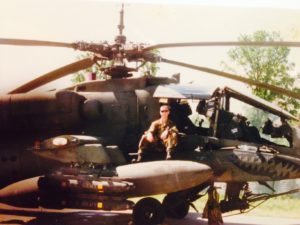
CPT Bill Golden, Camp Comanche, Bosnia 1997
Then, after being back at home station for a few months, out of the blue, or more accurately, out of the ‘green,’ Army Aviation Captain Bill Golden got orders to attend the Infantry Advanced Course (February 1998). What? Why would an established Army aviator be sent to an infantry school? “I didn’t want to go,” he recalled. “But I guess I was in really good shape, and they figured I had a really good profile record, so the Army decided I was going to go to Fort Benning, Georgia.” Thankfully, his reaction upon completion was quite different from his first impression: “Turns out, it was the best thing I could ever have done! I mean I ran myself to death out there. And I realized that I was no longer the fastest guy in the company. Those infantry guys were exceptional (e.g., running/physically fit). But fortunately, I could hold my own!” Golden did so well, in fact, that he ended up being a class leader, which was a really unusual achievement for a non-infantry guy. “I actually read all the assigned books and I read the doctrine and, best of all, I understood it (good thing, because in the end, he had to know it!), while many of his classmates, he remembers, apparently chose to ignore it! So, apprehensive at first, Captain Golden ended up doing “really well” at the infantry school.
His next stop (his post-infantry school ‘reward’?) would come in August 1998, when he received orders to Korea (unaccompanied!). Meaning, South Korea and without family! Awkward, in that, by now, he and Carey had three very young sons. However, as sometimes can happen with command connections, Golden’s good friend and colleague from Fort Bragg, LTC Tony Crutchfield, was then the battalion commander where Golden would be stationed in Korea. So, with command approval, he was ultimately able to bring his family with him to Korea for that several month assignment! Fortunately, as well, in that all of the company commanders had their wives/families with them, so having Carey and the boys there wasn’t an exception! Upon arrival in the Republic of Korea, he was given command of an Apache company, in the Second Infantry Division, with about 50 personnel and eight aircraft.
For Golden, this turned out to be another, as he put it, “phenomenal experience.” A key reason was that he was then working with many of the captains who had trained with him at the Infantry Advanced Course! “They’re the guys on the ground that I’m talking to. I know them all personally, so it was a very different experience because of that,” he remembered. An additional highlight was that a couple of his officer counterparts (S-3’s) were Task Force 160 aviators. Golden had been hearing about the 160th Special Operations Aviation Regiment (SOAR) for several years, and had decided that if the opportunity came along, he definitely wanted to move in that direction. With others around him having already assessed for the Task Force, he decided that then was the right time. “So, I began to get myself ready mentally and physically (including doing a lot of swimming), along with considerable flying, including doing so with goggles, since nighttime is when the 160th flies its missions.”
So, in the Summer of 1999, his preparation completed, Golden went to assess for Task Force 160. For him, even just approaching their post entrance made a real impression on him. “I definitely realized then, when heading through their gates, what a special unit I was walking into,” he recalled. Golden assessed, did well, and was selected to join the Task Force. But, as it turned out, there was a bit of a problem. When he called his branch assignment officer back in Alexandria, VA to indicate that he had successfully assessed for the 160th. The Army had a different move in mind for Captain Golden.
Seems he had been forced to choose a next assignment before he had assessed for the 160th. And that assignment, completely different from his then-immediate goal, was to be an Observer Controller (O/C) at the Joint Readiness Training Center at Fort Polk, Louisiana for two years, after which the decision would be made about moving him to the 160th. It was the old ‘be careful what you ask for,’ but recall, that he had been compelled to make that next assignment choice prior to deciding on the 160th for his ultimate service direction.
Although initially unhappy about that assignment, it actually worked out quite well. Recalled Golden: “It was another one of those things that I just didn’t want to do, but as it turned out, it was probably one of the best assignments I’d had. I really loved being there!” He was able to fly a lot while at Polk, accumulating about 450 flight hours in a small OH-58 Alpha Charlie scout aircraft, and almost 75% of those hours were with night vision goggles, perfect preparation for his planned future with the Special Operations 160th. “I learned so much flying that aircraft. And I got to go evaluate Apache companies, and OH-58D companies, as a company-level evaluator,” he recalled. After 16 months, he was able to at least move over to Special Operations aviation work, as the plans officer for the 160th, whenever they came down to Polk for pre-war training. In addition, while there, he got to attend “a ton of schools,” one of which qualified him to control jets in the air for ground fighting integration.
So, then, one morning early, as was his normal routine, he was in Fort Polk’s gym working out. The date was September 11, 2001. Then, unexpectedly, as it was for all of us, Golden saw something on the overhead TV screen that would forever be riveted in his mind. “I’m on the treadmill running, and I see the planes hit the building!” Struggling to get to the 160th at the time, he had been getting ready to go assess for a different Special Mission Unit. But once those twin towers in New York came down, and the Pentagon was hit as well, training pretty much stopped. “At that point, I got on the phone with my assignments guy and let him know clearly that I wanted to go with the 160th. I want to go!” said Golden, leaving no doubt about the seriousness, and the urgency, of his request. “My last bit of flying was about to come to a halt,” he remembered. “If I don’t get there now, I’m about to go fly a desk!”
Within the 160th, the established practice is that senior officers are permitted (expected) to do the same jobs that were done by lower ranks in regular Army aviation. Given the urgency, both from Golden, and for our nation at that critical juncture, at that point, things moved quickly for him. “Within 30-days, I have orders, and within 30-days later, I’m there!” In November 2001, Golden moved his family to the headquarters of the 160th at Fort Campbell, Kentucky, quickly bought a house, moved in, and was set to begin his long-desired and prepared-for 160th Special Operations Aviation Regiment (SOAR) career. First step, Green Platoon.
Green Platoon is all about learning to do the basics, at a higher level. “They teach you how to fly, shoot, swim, stress physical fitness, and you learn battlefield medical triage. And they teach you how to do it all exceptionally well,” remembered student-again Bill Golden. For instance: “They don’t teach you how to navigate with systems. You learned how to navigate with a clock, a compass, and a map.” In terms of aircraft, he would now be flying MH-6 ‘Little Birds,’ a McDonnell Douglas airframe, MD530F, specially modified years ago by the 160th to fly specialized missions. “These are urban fighters,” said Golden. “Four of them in a real tight row, go down a street, with guys sitting on the outside (remembered from ‘Black Hawk Down’). That’s the company I’m assigned to and trained with (1/160th/Task Force 160/packaged per mission & attached to a ground force) at this point,” he recalled. It was then April 2002.
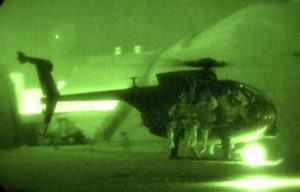
MH-6 Little Bird Baghdad, Iraq
At that time, the War in Afghanistan was underway, but there was no role then for ‘Little Birds.’ From the standpoint of the 160th, “it was a Chinook and Black Hawk war,” remembered Golden. Then, in August 2002, Golden began his first war-time deployment, this one to Saudi Arabia, as a liaison officer, operating in a Combined Air Operations Center (“CAOC”), which is the control point for all of the Air Force, Navy, and Marine aviation assets. During his ninety-day assignment there, he was “working all sorts of coordination missions on the ground. Not flying at all. Twelve hours on/twelve hours off. I learned a ton. I learn how we run air battles and who controls them.”
Later that fall, mission planning began for the invasion of Iraq. “I get put on the package that’s going to deploy to Iraq,” said Golden. “As I recall, there were a lot of unhappy people over who got picked and who didn’t. I would be commanding the ‘Little Bird’ assault package that went to Iraq.” That aircraft simply hadn’t been the right fit for Afghanistan. “But Iraq didn’t have the same type of terrain to deal with, it wasn’t that high above sea level, and there was a lot of urban fighting. And so, we were fighting in urban areas, towns/villages, and the ‘Little Bird’ was the perfect platform to do that mission,” recalled Golden.
“My first mission to Iraq was in support of a special operations ground squadron that was having to do a deep penetration into Iraq, because Turkey would not allow entry for our forces,” recalled Golden. “They launched a special-ops squadron early, into the western part of Iraq, to try to prevent Saddam Hussein and his family from escaping to Jordan and prevent the forces in Northern Iraq from reinforcing south. They went up into Tikrit and severed the main road so that we could isolate Baghdad, and so that the Marines and Third Infantry Division could make it to the capital city.”
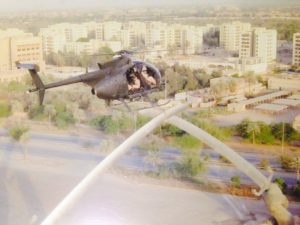
MH-6 Iraq 2005
During this phase, he and his unit were out west in the desert handling missions at night, while sleeping, and camouflaging their aircraft to prevent detection, during the day. Then they changed out with other units, loaded up, and headed to Baghdad! By this time, our Marines and the Third Infantry Division soldiers had made it there to Iraq’s capital city. The Americans had cratered the main runways at Baghdad International Airport, to prevent jets from landing and taking off from there, so when they flew into Baghdad on MC-130 Aircraft, they had to land on the Parallel Taxiway. “And then we immediately unload began looking for Americans who had been taken hostage by Hussein’s forces.”
North Eastern, Saudi Arabia had been the forward stationing base for Golden’s unit. Now, he moved his guys on into Baghdad International as the fighting intensified. “We arrived and went into this blown-to-pieces hanger and that’s where we’re living, cots or couches on the floor. Ground forces and aviators, we’re all in there together,” said Golden. “It was an interesting time! We’d wake up and head out on a mission to try to find those hostages (assisted by U.S. intelligence). While assigned to the 160th, It was the first time I’d ever worked with a mechanized armor squadron (Army 3rd ID).” And he quickly discovered that 160th aviators and Abrams tanks & Bradley fighting vehicles function on different timelines. Very different timelines!
Golden’s aircraft were out on station way before they could hear and see the approaching armor unit. “We arrive in our Helos at the time the mission brief specified we should arrive, with snipers onboard my platform, flying around the suspected location looking for any movement or sign of people. Just flying around wondering where our tanks are when, out my right door, a giant explosion goes off. Well, it’s the Cav. shooting rounds into an already quite destroyed Iraqi (old Soviet) tank! And they kept on firing, while I concentrated on getting the heck out of the way! That was one of my first ‘welcome to working with armor’ experiences.
They turned out to be great professionals, but those first few missions were really a big learning experience for us,” he remembered.
And that started repetitive rotations to Iraq for Golden. “I’d go home for a month or two, then go back for a month or two. Until, ultimately, I came back to the U.S. to attend Command & General Staff College (Summer 2004) for a year at Maxwell Air Force Base in Montgomery, AL.”. (He was promoted to Major in June of 2004 at Fort Campbell, KY.) His mother (in Alabama) passed away there during that period, so it was fortuitous for him to be back in Alabama to help his dad during that sad and trying family time.
One year of schooling passes, he graduated, and then it was back to Fort Campbell for Major Golden and his family. There, he took command of the same company (vs. Captains in the regular Army; in the 160th, Majors command companies) where he had previously served as a platoon leader (A Company/1-160th). Two years followed, with the same shuttling back and forth to Iraq. “And we were doing all kinds of innovative things, finding the enemy wherever they roamed and hunting them in ways not before utilized” said Golden. “We developed all kinds of dynamic tactics for taking down targets. What happened was that the enemy got savvy to the fact that we had given them the ability to move around in the daytime and communicate freely. (‘Little Birds’ had generally flown only at night)! So, we changed our tactics. We began to dynamically target them while they were moving,” he recalled. “Primarily going after high-value targets. The type of individuals was bringing in high-casualty-causing IED’s that had a core capable of penetrating our armored vehicles, including tanks. So, those high-value individuals became part of our focus. And we got really good at it! It was a tough blow to them, because it resulted in very dynamic engagements. We interrupted and tracked the way they maneuvered. They (enemy) were forced to get very quiet. They stopped being able to talk to one another. Which made it difficult for them to control a cell. It just put fear in their hearts to drive, to move, to talk, to do anything, and we just significantly disrupted them,” he remembered.
Golden spent two years in company command. Shuttling back and forth between home, Iraq, and Afghanistan, “over and over. And we spent those years just honing our skills, and getting very good at our jobs,” said Golden. In 2007, he came out of company command to become the Executive Officer (XO) for the First Battalion of the 160th at Fort Campbell (about 800 soldiers), during which time he also became the Task Force Commander overseas multiple times. “And that means the decision-maker for missions along with the ground force. You are the final word. You may have to say “No” on some missions, and that’s really tough with ground forces. So, you’ve got to have the credibility to be able to do that. And you have to be right!” recalled Golden. “Those were some tough years, we lost our teammates, but there was a lot of learning, and we got really good at what we did,” said Golden.
In 2008, while still with Special Operations, he was given a two-year assignment, state-side, to Alexandria, VA, with the Special Management Division. He became the “assignments guy,” said Golden, meaning that he had to designate prospective 160th soldiers for the Green Platoon, working directly with Human Resources Command, which also included solving SOAR recruiting issues during wartime. “The entire Army was deployed. Everybody was hurting for people. And there weren’t enough Army aviation brigades to adequately source prospects for the 160th. We generally don’t take guys out of flight school, so candidates would have to come from within the conventional Army. But often those commanders wouldn’t permit their aviators to assess for the 160th because they were too valuable to them right where they were,” said Golden, thinking back.
“So, it became a bit of an adversarial relationship. We were all fighting for the same resources. They had their missions to accomplish, and we had ours. Fortunately, the Army G-1 determined our recruiting needs to be the top priority,” recalled Golden. Although this was an assignment he never wanted nor sought, he did end up learning things he never knew. So, for him, it actually turned out to be “a great two years.” But initially, he had made it quite clear to his Commander that this “was definitely the last job he wanted.” And without missing a beat, his Commander gave him this classic response: “Good, then you’re the perfect person for it!” Among the positives of this two-year assignment, while working in Alexandria, he was promoted to Lieutenant-Colonel (Spring, 2010).
Following this important manpower job, LTC Golden returned to Fort Campbell, knowing that he had successfully passed the boards and had been selected for up-coming command of the 3rd battalion of the 160th. There would, however, be a one-year wait. At Campbell, he began transitioning into Chinooks, following all of his experience flying Apaches and ‘Little Birds.’ So, he spent the next year going through the MH-47G Chinook qualification course, completing his pre-command courses, and serving as the Regiment’s planning officer for fielding their new model Black Hawks (MH-60M).
In June 2011, he arrived at Hunter Army Airfield in Savannah, Georgia as the new battalion commander of the 3/160th SOAR (“Night Stalkers”). And while our nation’s military continued to shuttle deployments between Iraq and Afghanistan, the war focus at that time, was clearly shifting more totally toward Afghanistan. As a matter of fact, the last three Black Hawks left in Iraq that year were actually from Golden’s 3/160th battalion. And with America’s more dominant emphasis now turning to Afghanistan, along with assuming his battalion command, just one month after arriving at Hunter, LTC Golden was then deployed to that country as Task Force Commander (July 2011).
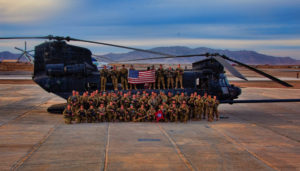
LTC Bill Golden in Kandahar Afghanistan with the ARSOA Task Force, 2011
“So, I go over there with the team, and went directly to Kandahar and spent about a week flying with my guys. That’s what I wanted to do. I did missions with them, now flying Chinooks,” said Golden. And he vividly remembers his very first Chinook mission flight there. He was flying out of their operations site near Shank, Afghanistan, a Forward Operating Base (FOB) that sits at about 7,000-feet above sea level. It’s way up in the mountains with very rugged terrain, located over in the east-central part of Afghanistan, with, reportedly, some really dangerous bad-guy areas in that region, in fact, well known to be “rife with Taliban and al Qaeda.” Golden recalled that: “The terrain was unlike anything I’d ever experienced in my life. It’s just mountains everywhere, with deep valleys and gorges running through them. And these are the very areas where U.S. troops are known to get shot at quite a bit!
“I get into the Chinook, and we taxi out and take off. And the guy (co-pilot) who’s flying with me is probably overly trusting in my capabilities with this aircraft! Mainly, at this point, because I’d never seen, nor flown, in dark like this,” he recalled. “Even just trying to keep up with my lead aircraft was difficult. I was concentrating on staying close to him, while not hitting mountains! And while listening to all the radios. There’s just a lot going on, and I’m trying to freakin’ keep up with the guy flying in front. All I can see are his IR lights, which are meant to be really subdued, so that people on the ground can’t see them! And all the while I’m thinking, this is going to be one intense challenge. Meanwhile, the crew on board is going through their checks, getting ready to commence weapons fire, if needed. The guys are amazing, super calm, no one seemed concerned. And in my head, amidst the almost total blackout outside, I’m having this conversation with myself: Am I really ready to do this? Matters not, as we’re soon nearing the release point, one-minute from touch-down. And, again, I haven’t landed a Chinook in combat – ever – and worse yet, never in blinding dust. I’ve trained, but never done this for real! I can see our lead aircraft heading down in front of me. Then, suddenly, the dust kicks up and the lead Chinook disappears. At about 80-feet down, I can’t see the ground anymore. I come all the way down to the deck, with the crew chiefs calling out what they can see. And I’m looking at the symbology, and I land that Chinook! Bumpy, but landed and stopped,” remembered Golden, in amazing detail, as if it had just been the day before.
Upon landing, ramp down, the guys (special-ops soldiers in the back) run off to begin their ground mission. The Crew Chiefs then quickly raised the rear ramp, and he took off. He and his crew returned to their home field without incident. “We survived!” said Golden. “I had completed my first ‘in-fill’ Chinook mission in Afghanistan. I was feeling completely overwhelmed because of the total darkness, and the challenge of the surrounding terrain, but what I realized is that the training that we all get is far more than adequate to see us through. You know, trust your equipment, trust your people, trust your training, and it’s going to work out fine,” said Golden. “And that mission was just the first of many. I was really blessed to be able to fly a lot while I was over there.” He would rotate back and forth, to home and war (deploy two months, then home six.)
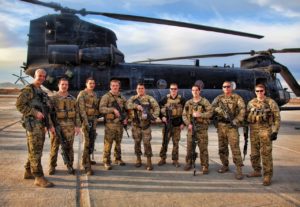
LTC Bill Golden (far left) and CSM Estevan Sotorosado (center) with MH-47 Crew prior to a mission in Afghanistan
During October 2012, came one of the more memorable missions that he personally flew as commander in Afghanistan, and one of several that he remembered very vividly. It was one that would take his team out near Bastion, Afghanistan. “I always felt like I wasn’t the one taking the biggest risk as the aviation component. If they were willing to go in on the ground, we’d do everything possible to fly them in there. And this night, we were going to in-fill 200 troops, both ours and the attached Afghans, within five aircraft,” said Golden. This particular place, however, was one where our teams were always taking significant ground fire. In fact, the prior week, U.S. Marine aircraft had tried to fly in, but had been shot at so badly that they had to abort the mission. So, the Marines special operations folks called Golden to see if he and his team would be willing to do that in-fill mission.
As he most often did when requested to assist in getting specialized troops into key operations locations, Golden told the Marines they’d do it. “Let us get the illumination and everything else right, and, yes, we’ll take you in. So, we flew out to pick up the Marine Special Operators and Afghan troops. I had five Chinooks, one from every SOAR battalion. That’s a whole lot of thunder! We take off with our share of those 200 Marines & Afghans in back, and on that flight in, we had Marine AH-1’s with us, plus AC-130 gunships overhead, and ISR (Intelligence/Surveillance/Reconnaissance). One of our overhead platforms was listening-in on enemy frequencies. And they reported enemy ground chatter on the radio about “something going on.” No question, they knew we were coming.” This particular area, the Helmand River Valley, was home to ample river water, a perfect lush environment for growing the region’s dominant cash crop: poppies! Because of the huge economic value involved, the Taliban and al Qaeda forces were militant about protecting the area from disturbance or destruction by American forces, whether from the air or on the ground.
As Golden remembered the mission: “It was about two in the morning, scheduled purposely, because if there’s someone(s) down on the ground still awake at that hour, they’re probably a bad human being! And so, as we fly down into this valley, we all split up and we’re landing probably about a quarter of a mile from each other. Coming down, we’re ‘browned-out,’ flying in through the giant dust cloud created by our landing approach, which kinda protects us, because not only can we not see, they (the enemy) can’t see us either! Ramp down and the Marines run out of the back. Then we get set to take off. And as soon as I do, we spot a guy on the ground smoking a cigarette. It’s around two in the morning. Gotta be a bad dude! That’s when we start receiving ground fire. The first guy to begin shooting is my right door gunner and he’s just hammering away on the minigun. About that time, I start flying out of the dust cloud, and then my aft machine gunner sees what my door gunner is shooting at, and he starts engaging, too.”
“With the billowing dust, and the intense darkness, thankfully, the bad guys can’t clearly see us. They’re just aiming at our engine sound. Three of our four guns on board are now firing cover, as we come out of the dust, and I’m now flying low down that valley as fast as I can. My guys (gunners) are just smoking it, and we’re coming out of there. Then, the smell of cordite hits me in the nose (flow of air in a Chinook goes from rear to front!). My eyes are burning. All five of our aircraft are now up and flying, with ‘red ropes’ (visual defensive gunfire) coming out of them. I think to myself, this is gonna be interesting. We’re all trying to get out of this valley together (5 Chinooks), and we’re all still being shot at from the ground, with machine guns and RPG’s. Miraculously, not a single bullet, or RPG, hit our aircraft. We shot thousands of rounds. It’s a tribute to their (gunners) ability to immediately pick up a threat, and then violently suppress it with overwhelming firepower. It’s that firepower that keeps bad things from happening. I attribute our good fortune, again, to great training, great communication, great situational awareness, and those guys just being damn good gunners!” recalled Golden.
Following a combat zone troop “in/ex-fill,” very often the 160th Chinooks would fly back to their staging area to refuel and “exhale”! And then stand-by for another flight assignment (very often at least two per night). But, when called, there were times when “we would literally fly pretty much all night,” he remembered. That continuous tasking rigor, and taking on the toughest missions when requested, was fully reflective of the Regiment’s long-standing motto and fervent belief: “Night Stalkers Don’t Quit!” “I did a lot of other missions, but those two described are just a couple of the more memorable ones in Afghanistan. And after each, without fail” concluded Golden, “you’re always mighty thankful that God was with us.”
Reflecting back, then, on his time in command of the 3rd of the 160th in Savannah at Hunter Army Airfield (2011-2013), Bill Golden recalled that one of the things he loved about Third Battalion was that “you were king of your own domain. No one was down here from the 160th HQ (Fort Campbell), it was just us. There was complete autonomy of command. I just absolutely loved it!”
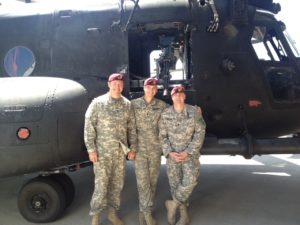
LTC Bill Golden CW5 Tim Denton (left) CSM Todd Hedrick (right) 3/160th Command Team 2013
While the Middle East warfare continued, “we also had a very focused training mission in South America (unit flew aircraft all the way there, a first). Fortunately, in the midst of it all, we had plenty of resources to train. We, of course, had guys continually deployed Afghanistan. We had great helicopters (Black Hawks & Chinooks). And we were blessed with highly trained and motivated individuals. And, recall, in my role prior to command, I had actually worked to resource Third Battalion, shaping the equipment & the people (Officers & Warrants), even before learning that I’d be coming here to command!” recalled Golden, thinking back. He also remembered the opportunity to consolidate his medics (18-all on flight status), and other staff units, in newer facilities at Hunter, making the coordination of activities and missions much more efficient.
Was there anything else that stands out in your mind about your Savannah tour? “Well, yes, definitely. The next thing I remember about being here was the people of the area. I had never been to a place in the military where area folks actually partnered with you, coming up and saying, hey, how can we help you be successful. I had never experienced that at all. So, it was the people we led, and the people who were around us in the community, that made that command experience so special and rewarding,” he said.
“My goal was to leave the battalion as healthy as I could, as highly trained as possible, and with the best leaders we could possibly provide. Previously all of the battalion commanders had historically come from 3rd Battalion. After my departure, some key 3/160th officers went on to command other SOAR battalions. That’s what I had hoped for, that was my goal, to develop super focused, driven leaders who could one day lead the Regiment. And that subsequent success was a source of personal pride from the leadership work I had put in,” said Golden.
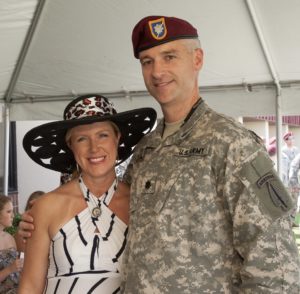
LTC Bill Golden with his wife Carey Golden
Concluding Note: Bill Golden retired from Command of the 160th SOAR Battalion, and from the United States Army, in June 2013. He was selected for an internship with Bank of America in New York City and was immediately hired full-time upon completion. His continuing Bank of America tenure began as VP Global Equities Risk, rising rapidly to his current position as Managing Director of Global Market Operations. He currently has about 400 employees reporting to him globally.
Golden also leads two internship hiring programs for veterans, with special focus on those who are interested in working full-time for Bank of America. Additionally, he was the Commander of the American Legion Post 754 (New York Athletic Club), focused again on helping veterans interested in financial services careers on Wall Street to secure entry internships. Along with all of that important involvement with job placement for veterans in New York City, Bill Golden is a Founding Director, now Chairman, of the Night Stalker Foundation, with a main focus on helping care for families by funding a program on being resilient and thriving, funding college scholarships for Night Stalkers, along with support efforts for Night Stalker Gold Star families.
Bill Golden is simply an outstanding example of impressive service, both in the military and well beyond in civilian life, focusing, as he has, beyond his demanding BOA executive work, on giving qualified veterans an important employment leg-up in transition and helping Night Stalker families thrive in a very rewarding and challenging assignment.

